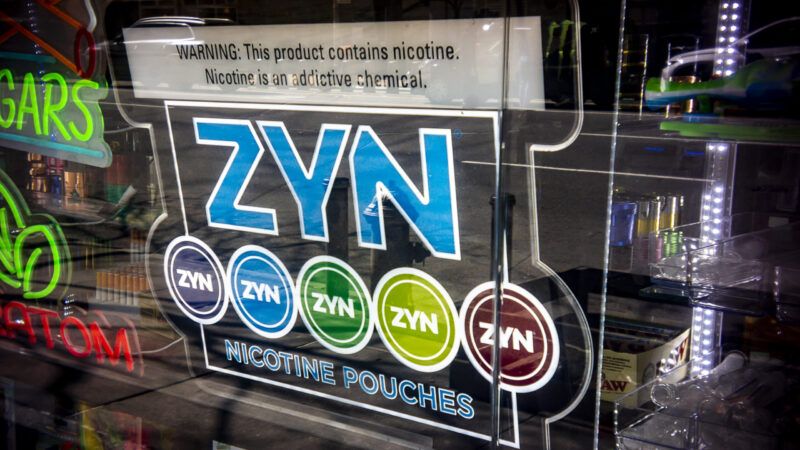Gen Zyn: Nicotine Pouches Help Curb Youth Smoking Rates
As young adults swap cigarettes and vapes for oral nicotine products, policymakers should recognize this shift as harm reduction instead of cracking down on personal choice.

Gen Z? More like Gen Zyn—because young adults love Zyn.
For the uninformed, Zyn are oral nicotine pouches that are slowly usurping the grip that e-cigarettes like Juul and Puff Bars have had on my peers. Given their rising popularity and positive impact on smoking rates, it's time to dispel common misconceptions about these products.
Contrary to popular belief, nicotine pouch products like Zyn—and other brands such as Velo and on!—are not the same thing as dip and chewing tobacco. You won't be seeing a nondescript bottle full of brown-tinged spit being lugged around by nicotine pouch users. And fans of Zyn are not limited to fraternity brothers and former high school jocks—a surprising number of young women also indulge in the products.
Nicotine pouches also aren't new, but they've recently been gaining popularity in the United States. The small, white nicotine pouches are placed between the user's lip and gum and gradually release nicotine. A range of nicotine percentages and flavors is available, allowing the consumer to choose the experience that is right for their desires and needs. The variety and discrete nature of nicotine pouches are likely why these products have become so popular with the younger generation and why youth smoking rates are at an all-time low.
Zyn has already been spotted at high-profile events. During the last NFL season, Tampa Bay Buccaneers quarterback Baker Mayfield was caught on live TV not-so-covertly popping a Zyn into his mouth mid-game while he sat on the sidelines. In February 2025, many viewers and social media commentators believed they saw Robert F. Kennedy Jr., the face of the Make America Healthy Again movement, sneaking a nicotine pouch into his mouth in the middle of his Senate confirmation hearing for secretary of the Department of Health and Human Services. Others are not as subtle: Social media influencer Emma Chamberlain posted a video on Instagram in 2024 with a Zyn in her lip while noting, "That's probably why my gums are receding."
RFK's Senate slipup was not the first time that Zyn had a spotlight in the nation's capital. In January 2024, then-Senate Majority Leader Chuck Schumer called for the Federal Trade Commission and the U.S. Food and Drug Administration to look into the marketing and health effects of Zyn. Schumer's main concern with the nicotine pouch product was, reportedly, that young Americans were ditching e-cigarettes in exchange for Zyn.
Despite Schumer's concerns, the increase in popularity of nicotine pouch products over other tobacco products is a good thing! Nicotine pouches do not pose the same potential harms—like lung disease—as e-cigarettes and other combustible tobacco products.
As with any substance, nicotine pouch users should exercise caution and moderation. The possible side effects of overuse of nicotine products like Zyn should not be trivialized. (One of my close friends had to get a gum graft after years of overusing oral tobacco products, including nicotine pouches.) But every substance, no matter how socially acceptable, comes with its own set of side effects and risks. Millions of Americans have normalized the upset stomach, jitters, increased blood pressure, and crippling withdrawal symptoms endemic in our coffee culture.
In fact, many of the side effects and risks of caffeine are the same as those related to nicotine. Thankfully, we don't see the government cracking down on coffee drinkers or threatening to impose blanket bans on their preferred stimulant. Just like we can't ignore the benefits coffee brings to the working world, we shouldn't downplay the positive impact of nicotine pouches for reducing smoking. Consenting adults should be allowed to take risks without the overbearing paternalism that has become normalized in government.
Critics and policymakers alike should acknowledge the relative health and social benefits of using Zyn and other oral nicotine pouches instead of smoking. When a product that has such positive effects appeals to a diverse set of users, regulators should foster and reward the innovation—not attack and restrict it.


Show Comments (9)